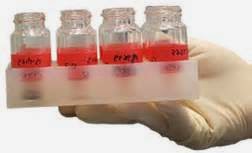Abstract .-
Background:
 Zalypsis® is a marine compound in phase II clinical trials for multiple myeloma, cervical and endometrial cancer, and Ewing’s sarcoma. However, the determinants of the response to Zalypsis are not well known. The identification of biomarkers for Zalypsis activity would also contribute to broaden the spectrum of tumors by selecting those patients more likely to respond to this therapy.
Zalypsis® is a marine compound in phase II clinical trials for multiple myeloma, cervical and endometrial cancer, and Ewing’s sarcoma. However, the determinants of the response to Zalypsis are not well known. The identification of biomarkers for Zalypsis activity would also contribute to broaden the spectrum of tumors by selecting those patients more likely to respond to this therapy.Methods:
Using in vitro drug sensitivity data coupled with a set of molecular data from a panel of sarcoma cell lines, we developed molecular signatures that predict sensitivity to Zalypsis. We verified these results in culture and in vivo xenograft studies.
Results:
Zalypsis resistance was dependent on the expression levels of PDGFRα or constitutive phosphorylation of c-Kit, indicating that the activation of tyrosine kinase receptors (TKRs) may determine resistance to Zalypsis. To validate our observation, we measured the levels of total and active (phosphorylated) forms of the RTKs PDGFRα/β, c-Kit, and EGFR in a new panel of diverse solid tumor cell lines and found that the IC50 to the drug correlated with RTK activation in this new panel. We further tested our predictions about Zalypsis determinants for response in vivo in xenograft models. All cells lines expressing low levels of RTK signaling were sensitive to Zalypsis in vivo, whereas all cell lines except two with high levels of RTK signaling were resistant to the drug.
Conclusions:
RTK activation might provide important signals to overcome the cytotoxicity of Zalypsis and should be taken into consideration in current and future clinical trials.
...